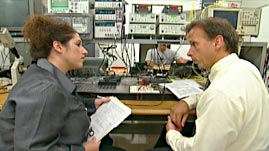Teachers' Domain - Digital Media for the Classroom and Professional Development
User: Preview


Source: Pathways to Technology: "Success Story: Gina Ferrera"
In this video adapted from Pathways to Technology, you’ll learn about the career opportunities available with a degree in engineering. Gina Ferrera, the community college graduate featured in this video, is a value engineer, and her work on night-vision goggles helps people see in the dark. Gina is responsible for improving her company's products, while improving quality and reducing costs. She explains why she went to college, decided to study engineering, and then work in telecommunications. Also, Gina talks about why she enjoys her job and her chosen field.
Maybe no one starts out in life interested in high-voltage capacitors; Gina Ferrera didn’t. She was a secretary at a phone company looking for a bigger challenge, and found her way to the world of engineering. Gina enjoyed problem solving and wanted to stay in the world of telecommunications, so she went to her local community college and got an associate's degree in laser electro-optics technology. She then went on to get a bachelor degree in engineering. Gina now works as a value engineer at K and M Electronics, ITT Industries, where she oversees the development of high-voltage power supplies for night-vision goggles. That’s where the capacitors come in—they store electricity, like a battery, and keep power flowing smoothly to electronic devices, so the devices don’t lose power or memory, if there’s a blip.
Engineering technology is a broad term for the field that forms the backbone of manufacturing and other industries. It’s often divided into smaller, specialized areas and skill sets. Electrical and mechanical engineering technologies create power systems and their components—things like electrical devices, motors, engines, semiconductors, circuits, and computers.
Career options for engineering technicians are as broad as the field itself. Jobs often require math, science, building, and problem-solving skills in industries like manufacturing, transportation, microelectronics, biotechnology, aerospace, and computer technology. Engineering technicians provide operations, troubleshooting, and critical information to guide engineering decisions.
“As I work, I learn every day,” says Gina. “I can see what I learned in school coming together at work. What I like most about electronics is the field is always changing. It’s very challenging and I have a new task daily.”
 Loading Standards
Loading Standards